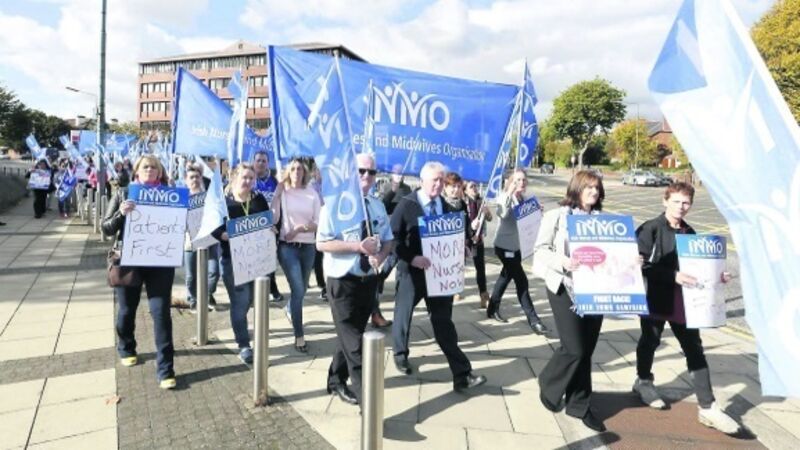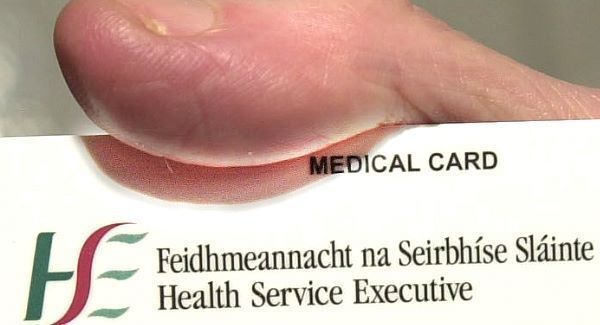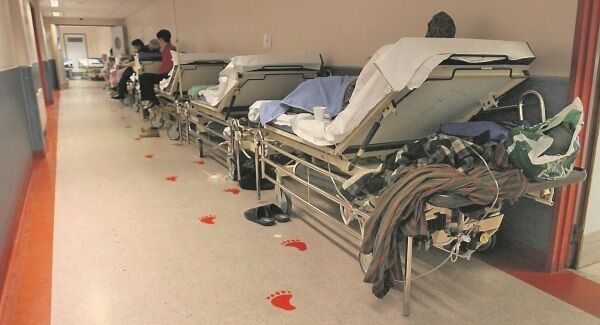A health service hurt by cut backs needs funding and joined-up thinking

Healthcare is, for many voters, the single most important public service. It touches the now, and it impacts the future, of every individual and every family.
It envelops illness and wellness, at every stage of every life. It is also an important economic investment in its own right, with measureable impacts on the competitiveness of economy. In the last general election, the posters and promises on waiting lists and emergency departments were taken seriously by voters. They won’t be this time around.
In Ireland, healthcare was eviscerated by austerity. It caused enormous and lasting damage. The troika turned their faces away from the inevitable consequences. The negative impacts of austerity on health are well established.
You can’t just turn off swathes of services through hospital closures and cutbacks, and then reverse these impacts with the flick of a switch. Medical and nursing staff emigrated, the investment in their education lost.
But the impact of austerity was magnified by fragmentation and a lack of unity across the system.
The Government has set out its achievements and its aspirations. In a balanced discussion, that case needs to be heard. But it also needs to be seen in context.
Promises were made. Some, such as universal health insurance, were desirable but never tenable. Commitments made on free healthcare were not joined up to what was being said by GPs, who actually deliver care.
There were issues around the capacity of the system and contracts with a profession decimated by austerity through retirements and emigration. And then there was the medical card debacle.

The inter-related issues of emergency department, bed capacity and waiting times are high visibility precisely because they are high impact issues for patients. The Government’s case is that they are putting more resources into these domains. Even with improvements in some areas, the NPTF data on waiting lists makes pretty bleak reading in specialties such as general surgery and orthopaedics.
It is only fair to note that the root causes of the failure go back well beyond the tenure of this Coalition. The problems are long-standing and they are systemic.
This Coalition came to power on a commitment to resolve them. With the best will in the world, it hasn’t happened. To take one example, the Irish Nurses and Midwives Organisation (INMO) recently decided to ballot members working in emergency departments on industrial action in protest at “the persistent and deepening levels of overcrowding across the country”. It takes a lot for medics and nurses to even consider strike action — it’s a vocation; they come in early and leave late.
Austerity made underlying problems worse. Capacity at every level, from community services to the acute sector, was cut. Hospitals were forced to accommodate to shortages.
GPs, senior consultants, and nurses were impelled to emigrate — and those remaining were forced to absorb unprecedented cuts in their terms of employment and in the conditions within which they worked.
The country lost existing medical manpower — as well as the newly trained — and they lost them to countries who offered career opportunities specifically designed to retain our emigrant medics and nurses. That can’t be airbrushed away.
This is not a strategy — pushing nurses overseas one year, and launching recruitment drives a year later, cutting consultant capacity one year and reversing policy as it becomes all too evident that the vacant posts are not attracting high calibre candidates from abroad.
More funding is needed but it’s not just a funding gap. A deeper problem relates to the smoke and mirrors at the heart of the funding model itself. In the recent budget, the largest proportion of the health allocation was to cover the deficit, carried over from 2015.
The real issue is not one of over-spending but of huge underfunding. The scale of underfunding has been partially obscured by permanent health insurance, which has been used by Government as a cash cow to mitigate the inadequacy of public funding.
If you provide inadequate funding, you get overspends and deficits. Mythical overspends distract attention from the underlying problems — and not just from the macro-funding problems.

They divert attention from what is actually happening on the trolleys, the ward rounds, and the car parks. This diversion takes different forms.
There are few better examples of the short-sighted penny-pinching that passes for “savings” and “efficiencies” than cutting the salary for fourth-year trainee nurses to well below the average industrial wage.
It is not the only form of indenture passing as policy — or of seeking nursing-on-the-cheap that corrodes the commitment of graduates who are weighing up whether there is a future for them here. They have options.
The solution to the problems in our health service will not be found in more reports — in new structures or in adversarialism. Nor will they be found in a denial of the problems and/or shooting the messenger.
Consultants and GP’s are wary of the consequences visited on doctors who speak out on behalf of their patients. That’s part of their profession — they are advocates for patients.
The Seanad recently amended the Health (GP Services) Bill, 2015 which was challenged by Senator Professor John Crowne because of the perceived scope for gagging criticisms. The powers that be have never liked independent-minded advocates such as James Grey, who cut through myths and spin.
Austerity has left its scars. But the impact of austerity was magnified by the lack of connectivity between acute services and, for example, properly resourced community and voluntary services are one dimension of this.
However, it goes deeper. The extent to which a national health system fulfils its core purpose of service depends largely on a unity of purpose — no less than for a family or a country. That unity is not there.
The most committed, and the most highly trained, of people are caught up in a system that is increasingly fragmented — not unified around a common purpose or ethic. It is one of control and contact — one that knows all about performance metrics and little or nothing about motivation.
This failure mirrors our atomised society, increasingly fixated on ‘self’. In terms of disease and health status, the health system is at the sharp end of this failure. The consequences are sad for many individuals.
They range from chronic obesity to coronary heart disease and mental health, all the way across to drunks presenting at emergency departments at weekends. The burden of a culture of self — and my choice — on the health service is growing.
The financial burden is socialised — no one pays but everyone pays. Rather like environmental damage. This is a distortion of the solidarity which should be at the heart of a national health service.
The health of the country is a matter for the entire government. James Sheehan, one of the country’s most innovative and internationally respected consultants, has made the point that the health status of the population should be the responsibility of the whole cabinet, led by a Minister for Health to provide the necessary joined-up thinking.












